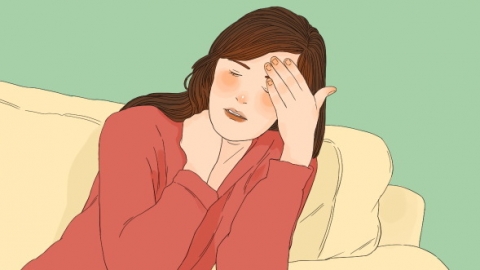What could be causing extreme irritability, restlessness, laziness, and weakness?
Extreme irritability and lethargy may be caused by insufficient sleep, excessive fatigue, hyperthyroidism, anxiety disorder, neurasthenia, etc. These symptoms can be improved through catching up on sleep, adjusting daily routines, or medical treatment. If symptoms persist or worsen, especially with palpitations or insomnia, prompt medical attention is necessary.
1. Insufficient sleep: Long-term staying up late or poor sleep quality disrupts the brain's neurological regulation, leading to irritability and mood swings. Inadequate physical recovery results in feelings of laziness and weakness. It is recommended to maintain a regular sleep schedule, ensuring 7–8 hours of sleep each night, and avoid using electronic devices before bedtime.
2. Excessive fatigue: Prolonged overwork or intense physical exertion depletes both mental and physical energy, causing emotional instability and a sense of exhaustion. It is advisable to manage work and rest schedules reasonably, avoid overexertion, take appropriate breaks, and maintain adequate nutritional intake.

3. Hyperthyroidism: Excessive secretion of thyroid hormones increases nervous system excitability, resulting in irritability, while an accelerated metabolism causes rapid energy depletion, leading to fatigue and weakness. Patients may take medications such as methimazole tablets, propylthiouracil tablets, or propranolol tablets under medical supervision to relieve symptoms.
4. Anxiety disorder: Chronic psychological stress leads to imbalances in neurotransmitters, manifesting as persistent irritability and emotional agitation. Heavy mental burden contributes to behavioral sluggishness and generalized weakness. Under medical guidance, medications such as paroxetine hydrochloride tablets, sertraline tablets, or lorazepam tablets may be used to alleviate symptoms.
5. Neurasthenia: Prolonged mental stress leads to diminished nervous system function, causing irritability and mood instability. Dysregulation of the nervous system is accompanied by ongoing fatigue, lack of energy, and difficulty concentrating. Patients may follow medical advice to use medications such as oryzanol tablets, vitamin B1 tablets, or diazepam tablets to improve symptoms.
Maintain sufficient sleep, eat a balanced diet rich in nutrients, take gentle walks or do light stretching in the morning, learn effective emotional coping strategies, communicate regularly with family and friends, and cultivate a positive mindset to support recovery.






